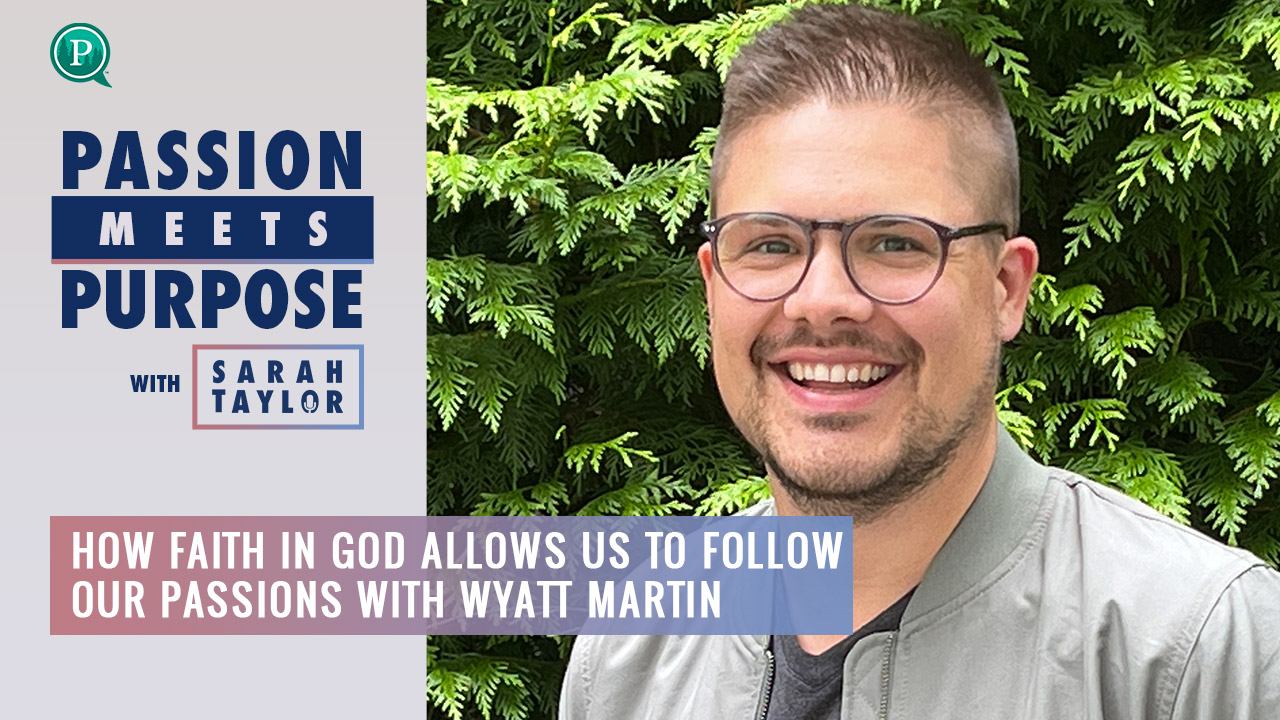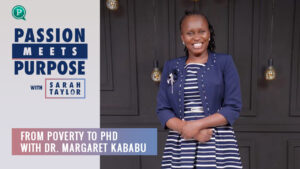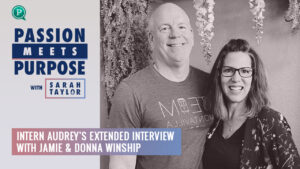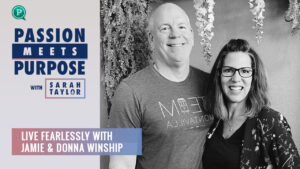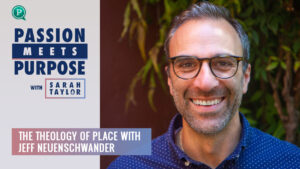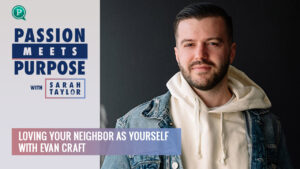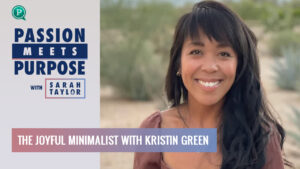Pastor Wyatt is the lead pastor at Alderwood Community Church and he joins us today for a conversation about how faith in God shows us our passions sometimes in unexpected ways. He didn’t know what he wanted to do for a long time. He talks about how being around money shaped the first vision he had for his life. However, through his curiosity, his love for conversation and people and the journey God took him on he began to recognize the true path God had for him.
Interview Links:
Transcription:
Ps. Wyatt [00:00:12] Are we driven by this burning desire to see people come to Jesus and experience the love of God through Him? And a lot of times the difference between being in a place that reaches those on the edges is really just you’re going to put the effort in.
Sarah [00:00:33] Joined today by Wyatt Martin on The Passion Meets Purpose podcast, which is all about the gifts and talents that each of us uniquely have and how we put those on display to give back to the world. Pastor Wyatt is the lead pastor of Alderwood Community Church. So let’s talk a little bit about your childhood. I find it fascinating how a lot of us had these talents as children and didn’t realize it. But now we’re adults and it’s like our parents can say, “I saw that in you when you were two.” Tell me a little bit about toddler Wyatt.
Ps. Wyatt [00:01:07] Yeah, well, I’m an only child and I now get to speak a lot to adults. And I actually always connect with adults better than I can with the kids because my parents were late in life when they had me. They’re in their forties. And so my childhood, I was just hanging out with adults all the time. I didn’t have siblings but learned how to talk to people and have always liked talking to people. And so that was a big thing of just…I love people, I love getting to interact with people stories. But the other part about me as a kid was I just had this passion to figure out how the world worked, how things work, and sometimes it was physical objects. It was looking at a toy or looking at, you know, the video game controller and just thinking, how does this thing actually do what it’s doing? And I want to know how the parts interacted. And, you know, I would ask my dad questions about all kinds of things all the time. And he’s a very smart guy who would give me answers and give me enough to keep on going and researching. And so I loved that. As that connected with my faith early, I just as I read the Bible, was never okay with simplistic answers that didn’t actually satisfy my curiosity. I wanted to read a text and figure out, But why? Why does it say this? And how does this relate to this other passage I just read? If God is this way, then how can He also say this? You know? And those kind of questions just really drove me. And I would say that’s still going on today. I’ve been asking those questions my whole life, and I think I will until I’m dead because there’s so much depth to go into in the scriptures. And that curiosity of really wanting to understand what’s going on has been something that’s driven me my whole life.
Sarah [00:02:35] So most people, when they’re in high school or early college, is when they decide like what how they’re going to turn that curiosity into a profession. So tell me a little bit about that part of your story.
Ps. Wyatt [00:02:43] Yeah, I do not have the story you hear sometimes of pastors where you know, the heavens open up and the Lord spoke to me and said, “You will be in ministry.” I’m envious of those stories sometimes. I didn’t know what I wanted to do for a long time. I grew up in the church and I went to private Christian school, actually a stone’s throw from where we are right now. I had a great experience, but, you know, there’s no perfect school. There’s no perfect way of schooling. As amazing as my time was. One of the things that was unique was it gave me an interesting perspective on the way that financial wealth interplays with our faith. And for me, what that meant was I grew up in a family that by any reasonable standard was very well-off, but it didn’t feel that way. I felt like I looked around at all these other families and they they had it made their life was incredible, you know, beautiful homes. You know, my sixteen year old friends at high school are driving Escalades and things like that. And they’re Christians and they’re walking with the Lord. That just shaped my view of what I wanted my life to be. I wanted to make a lot of money, and I was pretty generous with it. You know, I was going to serve in church and give to the church, but I was also going to enjoy it a lot. And that was my vision of what I wanted my life to be coming out of high school. And so as I went to college, I didn’t know exactly what I wanted to do, but I was limiting my options to things that made money. And so I started with engineering, quickly decided that because of those people skills that I was so passionate about that I talk about earlier, engineering just didn’t feel like the right fit to me. I didn’t connect with people who are more driven by physical objects and then conversations, and so I dropped that pretty quickly. Thought about being a lawyer for a while. And so I pursuing that and I actually still think that sounds kind of fun, but it was probably two years into college and I was serving in our youth group every week and I loved it. I was a small group leader. There was a mentor there named Dave who had taken me under his wing. He was the youth pastor. He had given me opportunities to teach and I was loving that and loving helping other people get to put some pieces together theologically and understand new truths about God. I mean, I just love that so much. And as I was wrestling with my future, I remember being on a mission trip with a youth group that I was leading and just having some extended time with the Lord to pray and to listen and. God just made it so clear to me some truths that I had just been intentionally denying in my own heart, which was that if you took money off the table, it was an obvious choice for me to go into ministry of my life. I mean, there’s nothing else. I enjoyed doing more. There was nothing else where I was seeing God work through my life more. And the only reason I wasn’t going down that path is because it just didn’t make enough money. And as soon as God kind of hit me in the face with that, thankfully the Spirit was able to melt my heart a bit and just bring me the realization that money is a terrible reason to deny the calling that God has put on your life. And so I changed my major right away. I was thankful that even though I was pursuing other tracks, I just had happened to choose a Christian university. I was at Seattle Pacific University and they had an educational ministry track and I switched my major and I had a lot of fear about what this path meant for me security wise, financially, financially. I was dating my now wife at the time and we wanted to get married and I didn’t feel like we could do that if I if I didn’t have a job and could put food on the table. And I didn’t know how hard that would be to find in ministry. Yet, as much fear as I had, God just provided beyond anything I could hope for. I mean, I had a job, a full time job before I even graduated at Alderwood, where I am now. Our family has never struggled to provide that food on the table. So I just did not have enough faith in the Lord’s provision at that time. It’s been fun to see the way that God has surprised me in that so grateful that I gave in and actually went down that path.
Sarah [00:06:49] And so you had that full time job. You got married. Talk about the progression from there.
Ps. Wyatt [00:06:56] Yeah. I mean, even, you know, I say I didn’t have that moment of clarity where God spoke to me. I mean, even when I decided to take this job at Alder and I was the middle school director at that time. Even then for me, it was just I feel like God is calling me to this now and I’m going to be faithful now and we’ll see what he does in the future and and not knowing what the path for that was going to be. But as I was at that job, God just continued to give me a heart for our church, for Alderwood Community Church, and open our doors for more opportunities to lead in bigger ways. A few years later, I became the pastor over all the student ministries. I did that for four or five years and then became the one of our executive pastors and working with our adult small groups and just continue to take the next step. But in that time, the currently pastor, whose name is Brad and I were just talking about the long term future. He had six or seven years left in ministry there and was starting to think about what might happen after he stepped away. And so he and I were having some some very long term talks about the idea that maybe one day I might follow him as the lead pastor at Alderwood. And so my wife and I were praying about that. There were other opportunities at other churches that I could have taken. But we just really felt like God had us at Alderwood. We didn’t know, there’s no guarantee that I was gonna follow Brad at all. But we felt like for now, we were in to see what the Lord did. And then God surprised us because that six or seven years of Brad centered alter became six months overnight as he just decided he was ready to move on and suddenly this very long term thing became a right now thing. And I was 29 years old. And Alderwood is a fairly large church. And, you know, it really was this time of asking God, “Is this really what You’re doing? Because I, I don’t feel like I’m ready. I’m not sure that I should be doing this.” But once again, it was a decision to say, “Lord, do what you want to do. If this is the door you’re opening, we love this church. I want to be the lead pastor here one day. I didn’t think it would be now. But if this is, this is it will say yes.” And I’m so thankful for a really Godly church that took its time praying this through. The elders went through a long process of discernment, and seven months later, the congregation voted and I became the lead pastor. And I’ve been here now for 18 months. And I hope I’m at Alderwood for my life, you know, but I’m actually still in that spot of God is not giving me that clear picture of the future. And I’m waiting for any open door he has if he’s going to tell me. But I’m very selfishly saying I want to be at Alderwood, so Lord keep me here and keep working.
Sarah [00:09:42] How did your time pastoring middle school students prep you for having an entire church?
Ps. Wyatt [00:09:47] Yeah, well, actually, quite well. I mean, one of the things that’s unique about student ministries is they’re almost like little mini churches, which can be a really bad thing if they, you know, go off on their own. But in some ways, it’s a really good thing for preparation because, you know, you’re teaching every week, you’re planning events, you’re overseeing small group leaders and all kinds of things that the churches do. So there’s a lot of prep there. But I had a pretty unique story because I grew up at Alderwood, so I’m now the lead pastor of the church that I was at as a baby because my parents have been it Alderwood for 40 years and still are. And and I actually left Alderwood’s youth group as a kid. Like I said, grew up in the church. My dad was an elder for a time. My mom is a Christian counselor and she had an office in the church. So I was around the church all the time and very much plugged in. But as I was entering middle school, I just had a hard time making friends. And mostly it was me. I was just I was a little bit of an awkward kid. I was shy and had a hard time putting myself out there. And then, you know, I’m at this large church with a large, very successful youth group that was so fun and high energy and crazy things going on all the time. But I’m a little bit more reserved and so I just didn’t quite connect. And I remember I was sitting by myself a lot in youth group and and just not feeling like I had people who cared about me relationally. And this isn’t, I don’t think any fault of the leaders or the pastor or anything like that. But for whatever reason, I just was having a hard time. And I remember one Sunday in particular, the youth pastor at the time was a great guy, a great pastor. But there was this one day where I was sitting in youth group in a chair by myself, feeling like I didn’t have friends and I was feeling lonely. And before the service started, the pastor got on stage and he never said anything like that before. But he said, “You know, it’s come to our attention that some people here feel like they they can’t really get connected. It’s like they can’t break in to the relationships here.” And, you know, my ears perk up. I go, “He’s speaking to me, this is exactly how I’m feeling” From the stage, he said, “I want to help those of you who feel that way. I want to help you figure out how you can fit in. Here, we are all about the Bible. We love the Bible. And so if you want to fit in here, you need to love the Bible, and you’re going to have no problem making friends.” And I was gutted. I was like, “I love the Bible.” I was doing well in my faith at the time. Like, I wasn’t rebelling against God or hating church or whatever. And in that moment, I just felt like, this is never going to work out here. I mean, you know, I felt like I was being blamed for something that wasn’t actually on me. And I just felt this chasm developed now. I was an immature 13 year old that time. I’m sure that I had my own fault in all of that, but that was kind of the beginning of the end for me at that youth group. And a friend invited me to a much smaller church and that was just what I needed at the time. And I went and, you know, went from a youth group of probably 150 kids to 30 and had some friends there already from school. And it was just what God use in my life for that time. That’s been a big reminder for me now that I’m leading a large church again, that just because we’re big doesn’t mean we’re the right thing for everybody. God uses all kinds of churches and all kinds of different seasons, and for me, I really needed that small youth group at that time. That’s the place where God gave me passion for ministry. And I was disciple and train. I got to teach and lead. And He prepared me, but was so funny is the first role in ministry I had was leading the youth group that I had left as a kid. And so as I came in as the middle school pastor, I mean, that memory was what was driving me was the memory of being the kid who stood on the wall and didn’t feel like I knew anyone. And so as I started off and working with our volunteer leaders, my passion was we cannot judge our success just on how much the kids who are in love it. We have to also think about how we are connecting the kids who don’t feel like they have church community, They don’t feel like they have friends. They want to know Jesus. They want to be a part of God’s family. They want to, you know, be in this with us, but they’re not able to do it quite yet. And so we need to turn our eyes off of just the the center to the to the edges and be a place that is insanely welcoming to people who come.
Sarah [00:14:19] Which is beautiful in theory. But my big question is, how do you accomplish that?
Ps. Wyatt [00:14:23] It’s so hard. Oh, it is so hard. And because everybody needs different things, you know, there’s all kinds of reasons why somebody might be having a hard time sometimes. Just personality of somebody shy, sometimes, you know, there’s church baggage or really horrible experiences in the past. But, you know, one of the things that I think it starts with is just our heart posture is are we driven by this burning desire to see people come to Jesus and experience the love of God through Him? And a lot of times the difference between being a place that reaches those on the edges is really just if you’re gonna put the effort in. It’s so much easier to hang out with people who are already bought in and who already love it because they give you as a leader, they give you the praise. I mean, they love what you’re doing. They, you know, it’s so much easier to hang out with people who already appreciate, you know, what’s going on than it is to pursue the people who aren’t convinced yet. So I think a big part is just that heart posture. And that’s been something that I’ve tried to bring with me in all the different areas that I’ve gone of, you know, our adult small group ministry. You know, one of the things that is so easy for a life group are small. We call our small groups, life groups, but it is so much easier to continue to have a group with the same people that you already know, where the chemistry’s already there than it is to risk open up your doors to a new person who might be weird. Let’s just be honest, you know. Even if they’re not weird, they’re definitely going to change the group dynamics. And so you risk taking this thing that you love and opening it up to change and you don’t know what the change is going to bring. But you know, what I’ve what I’ve tried to do is just to, again, give our leaders and our groups that that passion that this is what the gospel means. It means that we go to the people who aren’t yet in and we invite them in, not because they deserve it, but because Jesus paid for them on the cross. He adopts them as his own. And if we’ve received that, we need to be excited to give it as well. And so, you know, from a new position is the pastor at Alderwood. You know, one of the things that has just broken my heart is hearing the stories of people who actually have gotten connected at our church. But as they reflect on, you know, their first couple of years, they go one of the things that’s true about our church is, it is just hard to break into I’ve heard that phrase a number of times. I’m right now trying to crack that code to figure that out with our staff of how can we change that about our church? Changes that people say, “When I showed up here, I knew I was welcomed. I knew that people wanted me to be here.” And so I don’t even have the answers for you on that. We’re figuring it out right now together. But it’s one of the things that is a tension because you want the people at your church to feel like this is their home. This is their families. This is their community. That is hard to balance with also being totally open to new people who are coming in and welcoming them. You know, there’s a there’s a tension between the familiar and the new, between what you’re used to and what is yet to come. And so trying to kind of marry those things together is something that we’re trying to figure out the recipe for. But it all comes down to Jesus. I mean, Jesus, He had the 12 and He gave them everything. Like they walked together for three years. It was a safe place to feel at home, to ask questions, to grow, to be sent out. But He did send them out. And it was always to the crowds. It was always to those who hadn’t heard yet. It was always with this open invitation to come and to follow. And so we’re trying to emulate that as well.
Sarah [00:18:16] I know that that’s just one of your biggest purposes right now is building a community at the church. And then also just within the surrounding neighborhoods around our church, we have the Compassion Center. Do you want to talk a little bit about that?
Ps. Wyatt [00:18:30] Yeah, that’s been one of the newer things that we’ve been feeling God lead us into as we’ve looked at just what His purpose is for our church. We’re in the heart of Lynnwood and Lynnwood has gone through a big transformation is in the middle of a big transformation right now. You know, for a long time, Lynnwood was very much a suburb, a lot of single family homes. You know, many people who were commuting to jobs in Seattle. And we’re in this transformation from a suburb to really more of an urban center. Probably never going to be Seattle, but it might be Bellevue. So, you know, we have a light rail system coming through that’s getting built right now. There’s apartment complexes going up left and right. Alderwood has been there for a hundred years. So, you know, we’ve seen our fair share of transformations. When Alderwood was planted a hundred years ago, it was chicken farms. So somebody had to lead our church to that transformation. That’s not my job. But what we just feeling like the community that we’ve had because of our history is a lot of suburban families. It’s families in single family homes. We certainly are so happy that we have them and are going to continue to to minister to them. But we also recognize that as Lynnwood has changed, our church was a little slower to change where the the ethnic diversity we’re seeing in Lynnwood and the economic diversity we’re seeing in Lynnwood, the the diversity of having many, many more singles living in Lynnwood than married couples with kids, that if God has us here for this moment, we need to figure out how we can be a community that represents the diversity of the city that we’re in. And so that requires a lot of different things of how we think through that. But one of the big ones that jumped out of this was the local public school down the road from us is one of the main school districts that has the highest percentage of kids on free and reduced lunch. And there’s a lot of economic hardship right in our own backyard. And so we just started praying about what we might be able to do to reach those families and invite them into your community with us. And so a number of years ago, there was a building adjacent to our property that came up for sale. And even without knowing exactly how we were going to use it, we just through prayer, felt like God was opening the door for us to do something new. We purchased that building. One of the things that we’ve just been so excited about in these last years is on the first floor, we opened what we call the Compassion Center. It is our our spot to really make an effort to love our own neighbors in our own backyard, specifically those who are going through some kind of financial hardship. A lot of immigrants, a lot of people who are new to this area, who have not yet gotten their roots planted and their feet under them. And so we’re doing a lot of ministries around food assistance, and we give groceries out to families every week. We host community meals. We do tutoring for kids in school. A lot of times we’re doing that in homes that speak multiple languages. And we’re helping mom and dad figure out how to make their kids successful in school. And that’s just been a wonderful partnership. And there’s been so much life that God has brought to that ministry. And what I love about it is, it’s not just that we have been able to do some ministry outside of our walls. Our church is changing because of it. These families are coming into our congregation. We’re seeing more ethnic diversity in our congregation and people that have been at Alderwood for a long time I’ve seen have a new passion for ministering to people in need in ways that I think it was easy to be blind to before you know? When your church looks very suburban, it can feel like there isn’t that much need around you, and yet it’s everywhere. And God’s really given our church a passion to go and to serve and to meet people where they are. And it’s been fun to see that development.
Sarah [00:22:24] I know another thing you’re passionate about is I’m going to try to articulate this. I might need your help. Just the diversity of opinions.
Ps. Wyatt [00:22:33] Yes.
Sarah [00:22:34] Among people in the in the social media age that we live in?
Ps. Wyatt [00:22:41] Yeah. Do we have another hour to talk about that?
Sarah [00:22:44] So did I say that right? Like, how would you summarize it? Because it’s more than social media and it’s more than opinions.
Ps. Wyatt [00:22:51] I really think this is the big challenge for our church in this place, in this time. And it will be for the next generation. You know, COVID sped up this thing that had already begun to happen, which was the siloing of people based on your political perspective in particular, but really your worldview. The reason that that happening is multifactorial. Part of it’s because of the digital age we find ourselves in where the the points of view that you hear now and the people that you interact with you can pick based on your preferences. So rather than having to just get to know your neighbors who live next to you and you can’t choose what products they have now, you can go to the right news website or watch the right channel on TV, getting to the right Facebook messaging group or I mean, you name it so that you get into this echo chamber where the only people you are you interact with are the people that you already agree with. And I think the church can’t be that that if the church is going to have its identity, be based on the fact that we have been saved by grace through faith, we belong to Jesus, then we can’t only hang out with people who look like us and think like us and have the same history as we do, because that’s not what the Kingdom of God is. When when we are worshiping Jesus together in eternity, we are going to be with all nations, with all political perspectives, where, you know, all socioeconomic backgrounds, like that’s what the kingdom of God is. And our job is to be an outpost of that right here. We can’t represent the gospel well, if our church is the Republican church or the Democratic church or the, you know, you name it or whatever, but it’s so hard because people don’t have…They don’t have the the history and the the skills to play nice in the sandbox anymore because we don’t have to very often. And so it is really hard for people to break bread and be in life group together and worship side by side with somebody who voted differently than they did in the last election. And yet I think it’s so important that we don’t give that up.
Sarah [00:25:02] And it sounds like you have hope.
Ps. Wyatt [00:25:03] Oh, absolutely. Absolutely. I do not celebrate the fact that it appears that our society is drifting away from biblical values in some things right now that, you know, we’re seeing declining numbers of people who identify as Christians or identify as people who attend church. So I’m not celebrating that. But there is some good in it as well. There’s a time for God to do a new thing. And, you know, like I said, we’re called be a light. Light shines brightest in the darkness. And some of the best moments of the church in church history have been in some of the worst contexts as far as the political government that they’re in. I mean, think about even just in recent church history where the church in China has exploded, you know, in China, we’re seeing some of the fastest growth of the Christian church in the world. And it’s in a context where in, you know, in many ways Christianity is outlawed, where these churches are in homes, that they’re hiding things from the government. I mean, just because America may be declining in some ways spiritually does not mean that the church is. And so I think there’s all kinds of hope for what God’s going to do.
Sarah [00:26:14] You shared a beautiful illustration at your Christmas Eve candlelight service. It was a story. Was it from World War Two?
Ps. Wyatt [00:26:22] World War One yes in 1914.
Sarah [00:26:24] And would you share, just as we close our time together, an abbreviated version of that story? Because I feel like it sums up what we’ve been talking about.
Ps. Wyatt [00:26:33] Yeah, absolutely. Yeah, World War One was interesting because we we know it as World War One as this big conflict. But when it began, people didn’t know that it was going to be that. And so for many, the troops that were going off to war, they actually expected that it would be a few months long, that they would be home. You know, the war started in the summer. Many of those young men that they’ll be home by Christmas and yet by Christmas, it was very clear that that wasn’t the case. You know, we now call what was going on their trench warfare, where both sides had dug in. And in these winter months, they were living in these terrible conditions. These trenches were filling up with water. There wasn’t good sanitation. And so there was this huge sense of hopelessness amongst the troops at that time on both sides, that there was no clear end to the war. It was much bloodier than people thought it was going to be. And it’s becoming clear to the world that that was the case as well. And and the pope at the time, Pope Benedict wanted to do something that might help bring this war to an end. And so he appealed to both sides that on Christmas Eve there would be a truce. That they would not fight. On the evening when the angels sang to announce the birth of Jesus and and both sides of the war just dismissed it completely as, you know, some religious person meddling in something that wasn’t his mettle. And so they said there’s no way, there’s no truce. We’re going to keep on fighting. But as Christmas Eve came that year, something really unexpected happens. You can imagine being there in the muck, you know, with no hope of going home, fearing for your life, cold, freezing to death. And that Christmas Eve in the trenches, the British troops start to hear something strange from across no man’s land to the other side with the German troops were dug in and what they were hearing was Christmas carols. And the Germans had started singing Silent Night in German, which even though the Brits probably didn’t understand the words, they recognize the tune and they knew what song it was. And that evening, the British troops started to sing along and they were caroling together with these German troops that just hours earlier they had been shooting at. And it didn’t stop there. Eventually, that night on Christmas Eve, one of the German troops came out of the trench and yelled across to the British, the British troops on the other side and asked them if they could spare a bottle of wine, which was this, you know, hilarious thing to hear from the enemy that you have been fighting with. But the British troops responded. They came out of the they came out of the trench and they met the Germans in the middle of no man, no man’s land. And they introduced themselves to each other. And they started to actually become friendly. They talked about their families. They shared photos with each other. And what happened that night was that without permission from any of the leadership, the troops just on their own, decided that there would be a truce on Christmas Day. They agreed not to fight each other the next day and that next morning on Christmas, they came back out of their trenches and for a day they were friends. The one of the British army guys set up a barber shop and was cutting the hair of the Germans. And, you know, they were bartering with cigarettes for these haircuts. And somebody found a soccer ball and there was a soccer match in the middle of no man’s land between these troops. And for me, you know, this only lasted a couple of days, but it’s just this picture of the power that the message of the gospel has to bring reconciliation between enemies, that people who just hours before had been trying to kill each other, literally. There’s just something powerful about the message of Jesus, about God entering into our story that transcends that. And I think that’s just as true today. And I think it’s the message that people need.
Sarah [00:30:17] For someone that wants to go deeper with you. You have your own podcast with Alderwood. We’re going to link up to it in the show notes, obviously, but share a little bit about that.
Ps. Wyatt [00:30:25] Yeah, it’s called Native Exiles and one of the pastors at our church, Steve and I have been doing that for a couple of years. We’ve loved it. Sometimes we have guests, but whether it’s just us talking or we’re talking with somebody, everything we’re doing is about trying to figure out how to follow Jesus in this tension of being people who are in the world, but not of it. How we can live, not removing ourselves from the reality of the world that we find ourselves in, engaging in with our neighbors or our friends, with people who think differently. And yet doing that in a way that is profoundly different, that speaks to the truth of Jesus and the gospel message. And so our topics are all over the place, but that’s what we’re trying to pursue every time we have a conversation. And I’d love for people to check it out.
Sarah [00:31:06] Absolutely. The link is in the show notes. Wyatt, thank you so much.
Ps. Wyatt [00:31:09] Thank you.
Sarah [00:31:13] Thanks so much for being here today on The Passion Meets Purpose podcast. We’re going to talk again in two weeks. But in the meantime, if you want to do us a huge favor, obviously you know this by now. If you leave a review, it really helps others to find this podcast. It also helps us to make it better and then you can contact us any time at purposely podcasts. Until next time. Thank you.
Follow this podcast:

